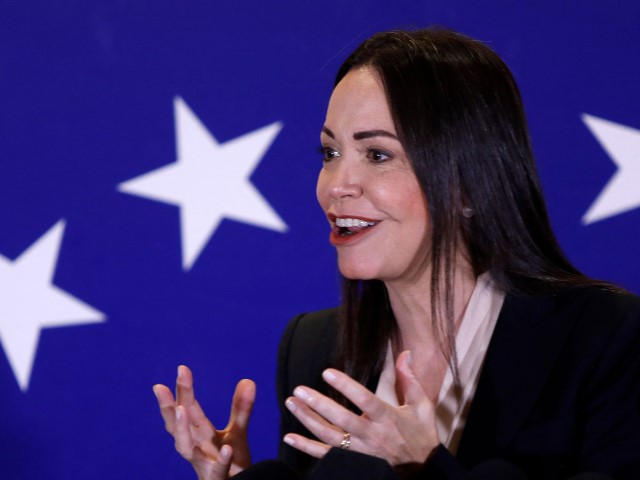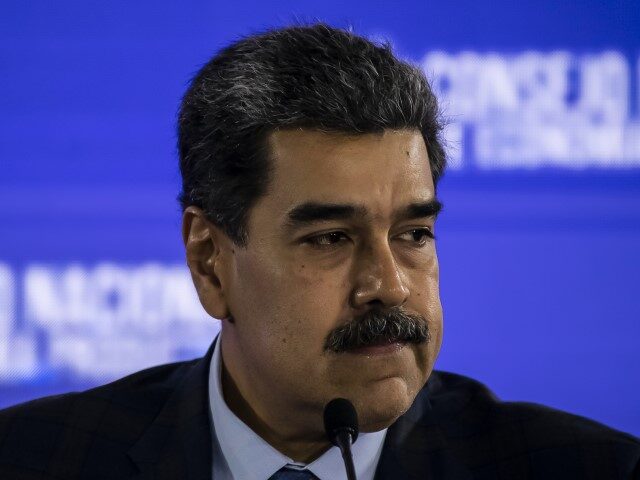CARACAS, Venezuela — The Supreme Justice Tribunal (TSJ) issued a ruling on Monday that suspends “all of the effects” of the “opposition” primary election held on October 22, in which former lawmaker María Corina Machado was elected to run against socialist dictator Nicolás Maduro in an upcoming 2024 “free and fair” presidential election.
The regime-controlled top court’s ruling effectively breaks a deal brokered between the Maduro regime and the administration of leftist American President Joe Biden, who granted the Maduro regime a generous oil and gas sanctions relief package in exchange for a vague commitment to hold a “free and fair” presidential election in 2024.

Venezuelan opposition’s elected presidential candidate, Maria Corina Machado, gives a press conference after her victory in the opposition’s primary elections, in Caracas on October 22, 2023. (PEDRO RANCES MATTEY/AFP via Getty Images)
The sanctions relief allowed Maduro to once again sell its oil and gas in the United States and international markets.
The ruling followed threats from Maduro himself and other members of his regime against the organizers of the primary. Maduro vaguely claimed the primary was “fraudulent” and part of an alleged coup against the illegitimate socialist dictatorship. He has presented no evidence whatsoever for those claims.
The Venezuelan establishment “opposition” held a self-organized primary election on October 22. Machado – a former lawmaker and the leader of the country’s only mainstream center-right party, Vente Venezuela – obtained a sweeping victory with over 90 percent of the votes in her favor. Prior to the election, Maduro banned Machado from running for any public office until 2030. Maduro regime officials have insisted that Machado’s ban will not be lifted.
Prior to the primary, both the Maduro regime and the “opposition” signed an agreement in Barbados on October 17 that contained “guarantees” that the regime would respect the internal selection processes of opposition candidates ahead of the primary election.
The agreement also stipulates a series of vague commitments towards celebrating a “free and fair” presidential election in Venezuela sometime during the second half of 2024, including the charting of a “route for disqualified candidates and political parties to quickly recover their rights.”
The Biden Administration, through Secretary of State Antony Blinken, has been pushing since 2022 to have both sides engage in negotiations towards “free and fair” elections. The United States welcomed the talks held in Barbados and, in turn, saw fit to immediately award the rogue socialist regime with generous oil and gas sanction relief.
The sanctions relief granted by the Biden Administration came at a time when Venezuela’s socialist regime, a key ally of top Hamas financier Iran, is moving ahead with plans to build an oil refinery in the Syrian town of Homs – a joint project with the Iranian and Syrian regimes – that will yield profits for all three when it begins operations.
Iran, which has dramatically increased its influence over Venezuela in the past decade courtesy of the Maduro regime, is likely to benefit from the sanctions relief package directly as well, as the Islamic regime has not only assisted Maduro in restoring Venezuela’s near-ruined oil refineries, but has been refining its own oil in Venezuelan refineries as of 2022.
The Maduro regime had the nation’s top court order the suspension of “all of the effects of the different phases of the electoral process conducted by the National Primary Commission (CNP).” The CNP is a non-government group established by the Venezuelan “opposition” to carry out all proceedings related to the primary election process, including the election itself. Maduro’s official National Electoral Center (CNE) refused to aid the primaries, despite its official responsibility to carry out elections.
The Venezuelan top court, in its ruling, is also demanding the CNP deliver all “administrative antecedents” of the process, including documentation pertaining to the candidacies of banned politicians such as Machado. The court will require the CNP to hand over all of the primary election’s documentation, which include the electoral table minutes, registries, voting books, ballots, and scrutiny acts.
Additionally, it has given CNP a three-day deadline to submit “a report on the aspects of fact and law, indicating the mechanism used for the safekeeping of the electoral material and the place destined to such effect.”
The TSJ informed the country’s Attorney General and hardline Maduro ally Tareck William Saab that, “in view of the multiple and serious denunciations related to this electoral event,” the primary “could configure the presumed commission of crimes against the Constitution of the Bolivarian Republic of Venezuela, the presumed commission of electoral illicit acts and the presumed commission of common crimes.”
Just as the court was issuing its ruling, the Maduro regime called CNP’s president Jesús María Casal and other members of the primary commision to be interrogated at the headquarters of the Public Ministry in Caracas, a process that took six hours. Casal reportedly left the Public Ministry without being seen or giving statements to the media. The commision has not issued further details regarding Monday’s interrogation at press time.
A spokesperson for the Department of State told the Colombian news channel NTN24 on Monday that the Biden Administration “will take action” if the Maduro regime fails to comply with the agreements reached in Barbados.
“We urge Nicolás Maduro and his representatives to uphold the commitments they made when they signed the political roadmap agreement in Barbados,” the spokesperson said. “The democratic opposition primaries on October 22 were an important milestone in Venezuela’s progress toward a free, fair and competitive 2024 presidential campaign.”
“The United States and the international community are closely aligned. The government will take action if Maduro and his representatives do not comply with the commitments under the electoral roadmap,” the spokesperson continued.
U.S. Senator Marco Rubio (R-FL), who has closely followed developments regarding the Maduro regime, urged the United States to reverse all sanctions relief as Maduro “had no intention of upholding the Oct 17th agreement & the result of the elections.”
Rep. Maria Elvira Salazar (R-FL) made similar calls, stating that the Maduro dictatorship “behaves like what it is: a dictatorship.”
“Biden must respond with concrete actions. If he does not, he will abandon Maria Corina [Machado] and the cause of freedom in Venezuela,” Salazar wrote on Twitter.
Christian K. Caruzo is a Venezuelan writer and documents life under socialism. You can follow him on Twitter here.

COMMENTS
Please let us know if you're having issues with commenting.